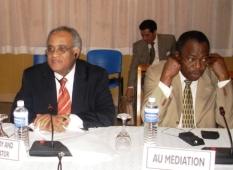AU mediators pledge to coninue Darfur peace efforts
May 6, 2006 (ABUJA) — The African Union (AU) has promised to continue international efforts to bring lasting peace to western Sudan’s Darfur region despite the refusal of a rebel group and a faction of another to sign a UN-sponsored agreement.
 The deal was signed in the Nigerian capital on Friday by representatives of the Sudanese government and the main faction of the Sudanese Liberation Movement (SLM), led by Minna Minnawi, in the presence of the peace talks host Nigerian President Olusegun Obasanjo and mediators.
The deal was signed in the Nigerian capital on Friday by representatives of the Sudanese government and the main faction of the Sudanese Liberation Movement (SLM), led by Minna Minnawi, in the presence of the peace talks host Nigerian President Olusegun Obasanjo and mediators.
But another rebel group, the Justice and Equality Movement (JEM), and a smaller faction of the divided SLM, led by Abdelwahid al-Nur, refused to sign, saying they would not accept the United Nations-sponsored deal.
“Our hope is to have everybody on board. The AU and the international community will continue the efforts to have a deal where every single movement (rebel group) will be in,” AU spokesman Nouredine Mezni said.
“The door is still open till mid-May to have the others on board. It is the AU Peace and Security Council that will decide the matter,” he said.
The council is expected to meet on May 15, but Mezni did not disclose the venue.
JEM spokesman Ahmed Hussain said “all options are still open. What I can say for now is that we are committed to our people and we are standing with them.”
Nouri Abdallahi of the al-Nur SLM faction also said his group was still open to negotiations, but added that delegates would start leaving for home Saturday.
Darfur, an arid desert region of western Sudan the size of France or Texas, erupted into civil war in early 2003 when armed local movements began fighting the Arab-led government in Khartoum, demanding more autonomy for the region.
In response, the Sudanese regime unleashed the Arab Janjaweed militia to carry out brutal attacks on Darfur’s largely black African population. The war has caused at least 180,000 deaths and left 2.4 million people homeless.
Two of Sudan’s closest neighbours, Egypt and Chad, welcomed the signing of the agreement by Khartoum and the region’s main rebel faction but urged the other parties to sign.
Chad’s Foreign Minister Ahmat Allami said in a statement he was “pleased by the conclusion of the peace agreement in Abuja “.
“The conclusion of this agreement marks a significant first step towards the establishment of a definitive peace and reconciliation between all the peoples of this land,” the statement continued.
But the minister criticised the JEM and al-Nur’s SLM faction for their refusal to sign, and called on them to do so “for the greater good of the peoples of Darfur and for the peace and security of the region”.
France also welcomed the accord. “The government of Sudan and the main rebel movement have had the courage to seize this unique chance to re-establish peace in Darfur and settle this crisis fundamentally,” said a statement from France’s foreign ministry, which also called on the rebel movements that were still reticent should join in.
UN relief coordinator Jan Egeland was due to arrive in Darfur Sunday in the first visit by a United Nations official to the region since the signing of the peace deal.
He will have talks with local leaders and visit refugee camps before heading to Khartoum Monday for meetings with Sudanese officials.
World leaders have given a cautious welcome to the peace deal but urged the other rebel groups to join it.
The accord offers a referendum on the future status of the region, obliges Khartoum to disarm and neutralise the Janjaweed by mid-October, provides for the rebel movements to be represented in the Sudanese government and creates a fund for the reconstruction of Darfur.
But analysts warned that a lack of political will to implement the treaty by Khartoum, already accused of reneging on promises from a previous agreement with rebels in southern Sudan, could prove disastrous for the country.
(ST)
